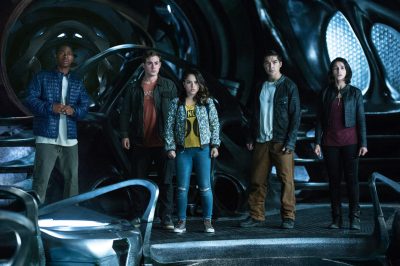
In this age of classic movies becoming TV shows and vice versa, it was only a matter of time before audiences received a full-fledged “Power Rangers” reboot.
The Power Rangers — a team of teenagers chosen by a wizard to defeat evil aliens with superpowers, suits and robotic animal-vehicles — first appeared on the scene in the early ‘90s in “Mighty Morphin Power Rangers,” a TV series based on Japan’s “Super Sentai Zyuranger.” The Power Rangers went on to become an extremely successful franchise of TV shows, movies, comics and action figures.
Dean Israelite’s “Power Rangers” is a reboot of the original Mighty Morphin universe, featuring the same five characters as Rangers fighting the same main villain, an ex-Ranger named Rita Repulsa (Elizabeth Banks). The plot centers around the original story of the kids becoming Rangers.
Basically total strangers, the teenagers accidentally stumble upon colorful crystal coins from a spaceship. They soon realize the coins have given them superpowers, and come back to the ship to find out more about this. Hidden in the ship’s matrix is Zordon (Bryan Cranston), an ex-Ranger who died in the fight against Rita eons ago. He explains that Rita is once again trying to destroy all life on Earth by stealing a special crystal, and the Rangers are the only ones who can stop her.
Rita was once a Ranger, too, but betrayed Zordon’s team for no reason provided. Her backstory is minimal at best, which does not help how ridiculous Banks plays her — with three-inch gold nails and over-the-top dramatics, she might as well be a swamp witch drag queen.
Instead of delving too deeply into fantastical lore, the film rightly chooses to focus on the Rangers themselves, who each have a token problem that makes them outcasts from Angel Grove, the small town in which they live. Three of the Rangers meet in detention a la “The Breakfast Club,” and some of their backstories are just as full of teen angst.
Jason (Dacre Montgomery) is the Red Ranger and the leader of the group. He fits the role because he was once the star quarterback of Angel Grove’s football team, though soon into the film, a prank gone disastrously wrong puts him on the sidelines. Thus, he is simultaneously the infamous town screw-up and the golden boy of the Rangers, leading the charge and encouraging them to fight.
Billy (RJ Cyler) is by far the heart of the film, much more charming than the sometimes-bland Jason. The Blue Ranger also happens to be mainstream cinema’s first autistic superhero — his diagnosis, as he explains, means that he sometimes does not understand humor and social interactions, but this does not stop him from lighting up the screen with his unabashed enthusiasm or comic relief.
In another bold move, Trini (singer Becky G), as the Yellow Ranger, is the first queer superhero. For a blockbuster motion picture, this is an important step for diversity and representation of LGBTQ characters in film. Though her “coming out” scene is not incredibly explicit, it is powerful for this reason, and Becky G’s acting is surprisingly good. Trini is also not defined just by her queerness. In fact, she is the most reluctant of the team to band together and seems to almost be the “bad boy” of the group.
Trini might have to fight for this title against Zack, the Black Ranger, who often self-labels as crazy. While his backstory is not exactly lacking, he feels the least developed of the characters, though not for lack of trying, as he is certifiably reckless.
Kimberly (Naomi Scott), on the other hand, feels the most dynamic. The Pink Ranger is a mystery for most of the film, though we know her as a cheerleader fallen from grace in a sexting scandal more complex than it first appears. She has more nuance than the others because of the ethical dilemmas she represents and comes to the team looking for redemption.
The “teenagers with attitude” all share this desire in some form or another due to their pariah status at school, and the film tries to add a bit of grit to the campy quality of the original series. This sometimes clashes with the source material — Bill Hader’s gleeful robot, Alpha 5, for example, expresses kid-friendly humor almost jarring in a movie featuring so many car crashes — but the lengthy investment in the characters pays off when, in the film’s final act, they morph into Rangers.
At that point, the story becomes less of a millennial tale and more of the Power Rangers fans know and love, complete with Megazords and the beloved theme song. One can easily imagine a few sequels building on this good-hearted fun, and fans old and new will look forward to them.

















































































































